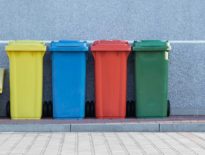Commuters in Surabaya, Indonesia can pay public transit fares by dropping off recycled plastic at designated centers in the city. The program was introduced by Mayor Risma Rismaharini to address two pressing problems for the city and the nation: increasing plastic recycling to reduce ocean pollution and getting more people to use public transportation. Indonesia is the second largest contributor to marine plastic pollution, behind the world leader China. The mayor is also credited with additional innovative measures to improve the economy and the environment.
Istanbul, Turkey has also developed a “recycling” currency for commuters. The city is installing “reverse vending machines” at metro stations that allow passengers to add credit to their subway cards simply by inserting a plastic bottle or aluminum can into the machine. The initiative aims to increase recycling in the city of 15 million and provide people with an alternative to falling currency rates.
In Haiti and the Philippines, the Philippines Plastic Bank, pays members of the public who volunteer to collect plastic litter. Once volunteers have returned the plastic to one of the Plastic Bank’s recycling centers, they can choose between receiving cash or being given cryptocurrency tokens that can be exchanged for food, water, cookstoves, and fuel. Marks and Spencer (M&S), an international retail giant, is now making shopping bags with 75% recycled plastic as an effort to reduce the flow of plastic into waterways around the world. Recycled materials will be sourced from the Plastic Bank and produced in Vietnam for world wide distribution.
U.S. cities might want to consider such a program for glass, as many single stream programs want to banish glass recycling from their systems. Recent calls to the glass industry identified several glass processing companies and end use manufacturers interested in retrieving glass from commercial and residential sectors of urban centers. One leading company stated, “Don’t believe the media reports that glass is worthless. Our processing plants need material to fill orders from industries for our finished products.” An official of the Waste Authority from Centre County, Penn. recently said, “To switch to single-stream would also certainly result in dropping glass from the recycling program….I mean, who wants to quit recycling glass.”





